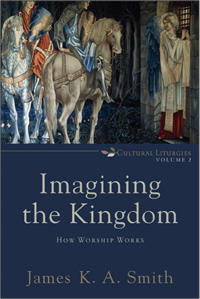
DARREN CRONSHAW reviews James KA Smith’s Imaging the Kingdom…
James K A Smith
Imagining the Kingdom: How Worship Works. Volume 2 of Cultural Liturgies
BakerAcademic, Grand Rapids, 2013
ISBN-13: 9780801035784
 |
“Imagining the Kingdom suggests the way forward is not just to communicate rules and principles, but to offer alternative Christian narratives that train people’s emotional responses and help them see things differently, and henceforth act differently.” |
If church and Christian education are about preparing and sending Christians to remake the world in cooperation with God, how do they do that? In what ways does the Gospel work its way out in the lives of Christians? What is it that best forms what we long for and love? How can churches and Christian universities foster not just right thinking but right acting, and recruit the imagination of people in the direction of the kingdom of God?
These are questions James Smith, professor of philosophy at Calvin College, explores in his Cultural Liturgies project, of which Imagining the Kingdom is the second volume of a three volume series of a philosophical theology of culture. Following Desiring the Kingdom, Smith continues to argue that formation happens not primarily through thinking and knowledge accumulation, but by actions and cultivating the right desires and an imagination that comes from imbibing where you are as an actor in God’s story.
The first part of the book lays theoretical foundations for a liturgical anthropology in conversation with French theorists (Merleau-Ponty and Bourdieu). These show the importance of habituation and formation, elevating the importance of practice and not just beliefs. Smith urges moving beyond an intellectualist approach and recruiting people’s imaginations and reforming how they perceive the world. If churches and Christian higher education do not do this for Christians, then society will – with its consumerism, militarism, nationalism and other anti-gospel liturgies.
People do not simply collect objective data and respond. They respond to situations primed by how they perceive the world, influenced by stories that have captivated them and captured their imaginations. Smith suggests: “We have a ‘feel’ for the world that is informed by stories that dispose us to inhabit the world as either a bounteous but broken gift of the gracious Creator or a closed system of scarcity and competition; and as a result, either I will just ‘naturally’ be disposed to see others as neighbours, as image-bearers of God, whose very faces call me in a way that is transcendent, or I will have a ‘take’ on others as competitors, threats, impositions on my autonomy.”
In Australia, this helps me understand how people respond to asylum seekers and refugees. Whatever the facts of their desperate situation, and regardless of what is often an articulated “worldview” of compassion and cultural valuing of mateship and a fair-go for battlers, many Australians – and especially Australia’s political leaders – respond and act in ways that are inconsistent with hospitality and more guided by perceived threats. Imagining the Kingdom suggests the way forward is not just to communicate rules and principles, but to offer alternative Christian narratives that train people’s emotional responses and help them see things differently, and henceforth act differently.
The second part of the book focuses on the nature of liturgies – Christian and otherwise – and explores how worship works. Smith articulates a high view worship; not in the sense of being overly formal, but being important for forming people and inviting them into union with God. He urges a new intentionality for worship, spiritual formation and pedagogy. Notably he urges making the most of the arts, metaphor and especially story to capture people’s imagination in Kingdom of God directions: “We don’t just need teachers and preachers and scholars and “doctors” of the church to tell us what to do; if the gospel is going to capture imaginations and sanctify perception we need painters and novelists and dancers and songwriters and sculptors and poets and designers whose creative work shows the world otherwise, enabling us to imagine differently”.
Liturgies, Smith argues, are cunning pedagogies. Popular culture has abundant forms that shape people’s responses and imagination. Kids play war-based video games, and grow up desensitised to blowing people up. Billions of people use smart-phones, and feel like they have the world at their fingertips ready to control their (bought) environment. Facebook has 1.1 billion people adopting a liturgy prone to self-display and competitive coolness around what you are seen doing. Taking a step back and reflecting on the influence of secular liturgies is important so they do not trump our faith, but also challenges us to be intentional in shaping our worship to capture people’s hearts and direct their actions.
Imagining the Kingdom draws on a very broad range of literature and Christian theological tradition, as well as a rich selection of literature, film and poetry. Academically significant but relevant to a wide audience, Imagining the Kingdom will be usefully engaged by worship leaders, artists, philosophers and pastors, academic teachers and those interested in Christian education at all levels.
This review was originally published in International Journal of Practical Theology 18:1 (June 2014)
Follow this link to buy this book – Imagining the Kingdom: How Worship Works (Cultural Liturgies)





